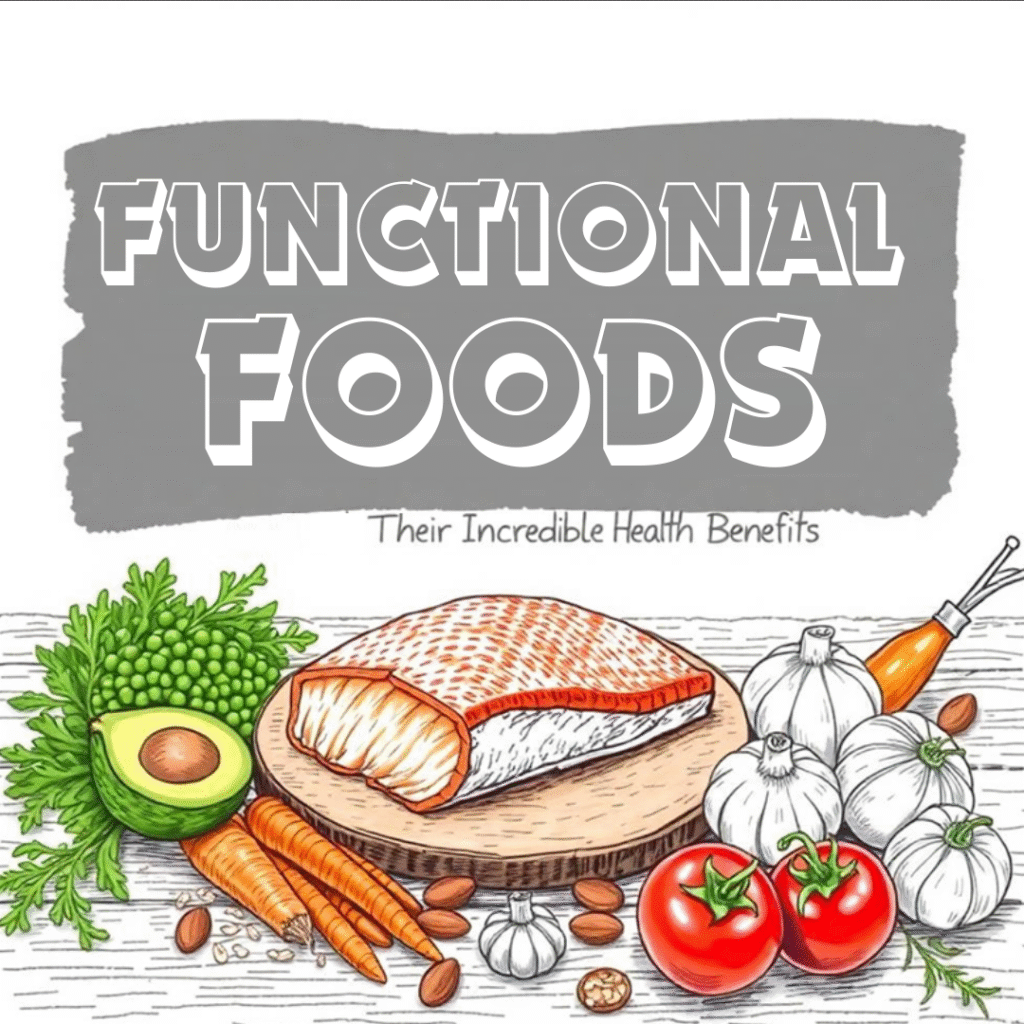

Table of Contents
Natural foods that offer extra health benefits beyond basic nutrition are becoming very popular today. These foods support better immunity, improve digestion, protect the heart and help the body function smoothly. In this guide you will learn what these special foods are, how they work and how to add them to your routine easily.
What are nutraceuticals?
Nutraceuticals are special parts of foods that support better health. They have bioactive compounds, which help reduce disease risk, improve immunity, support digestion and protect your cells.
Common nutraceuticals include:
- Probiotics: Good bacteria that help digestion.
- Prebiotics: Fibers that feed good gut bacteria.
- Omega-3 fatty acids: Healthy fats for your heart and brain.
- Antioxidants: Compounds that protect your cells from damage.
The idea of nutraceuticals started in Japan in the 1980s. Today they are used worldwide because they support good health naturally.
Adding nutraceutical-rich foods like fruits, vegetables, nuts, fermented foods, seeds and fish to your daily diet is easy and very helpful.
Categories of Nutraceuticals
Natural Nutraceuticals
These come directly from natural foods like fruits, vegetables, nuts, seeds, fish and whole grains.
Modified Nutraceuticals
These are foods that have added nutrients like vitamin D milk or calcium-added juices.
Added Nutrient Nutraceuticals
These are foods where extra compounds like probiotics, prebiotics or omega-3 are added to make them more beneficial.
Why These Foods Are Important
Daily use of nutraceuticals supports your body in many ways. They protect health, improve body functions and lower the risk of many diseases.
Here are some benefits:
- Heart Health: Omega-3 fats help reduce inflammation and protect your heart.
- Diabetes Control: Fiber-rich foods help manage blood sugar levels.
- Cancer Protection: Antioxidants protect cells from damage.
- Better Digestion: Probiotics improve gut health and immunity.
Regular intake of nutraceuticals builds strong long-term health.
Benefits for Children
Children need proper nutrition for fast growth. Nutraceuticals help in many ways.
- Brain Development: Omega-3 fats help brain growth.
- Bone Strength: Calcium and vitamin D support strong bones.
- Immunity: Probiotics help children fight infections.
- Eye Health: Carotenoids like beta-carotene support good vision.
- Healthy Weight: Whole grains and fiber support good metabolism.
Introducing nutraceutical-rich foods in early life supports better lifelong health.

List of Health-Boosting Foods
Fruits and Vegetables
- Tomatoes: Rich in lycopene for heart health.
- Blueberries: High in antioxidants for brain health.
- Broccoli: Contains compounds that may help prevent cancer.
- Citrus Fruits: Vitamin C boosts immunity.
Dairy Products
- Yogurt: Probiotics for digestion.
- Fortified Milk: Calcium and vitamin D for bones.
Whole Grains
- Oats: Helps lower cholesterol.
- Brown Rice: Supports gut health.
Nuts and Seeds
- Walnuts: A Good source of omega-3.
- Chia Seeds: High in fiber and antioxidants.
Fish and Seafood
- Salmon: Rich in omega-3 for heart health.
Healthy Oils
- Olive Oil: Good for heart and overall health.
Healthy Drinks
Pomegranate Juice: High antioxidant benefits.
Green Tea: Supports metabolism.

How These Foods Prevent Diseases
Nutraceuticals help protect your body from many diseases.
Bone Issues: Calcium and vitamin D support bone strength.
Heart Diseases: Omega-3 improves heart function.
Digestive Problems: Probiotics keep the gut healthy.
Cancer Risk: Antioxidants reduce cell damage.
How to Add Them to Your Diet
It is easy to include nutraceuticals in your daily routine.
- Add chia seeds or flaxseeds to your breakfast.
- Eat salads with leafy greens for lunch.
- Choose nuts or seeds for snacks.
- Include fish like salmon for dinner.
- Choose dark chocolate for a healthier dessert.
Small changes can make your meals more nutritious.
Dietitian’s Desk

Nutraceuticals are an important part of a healthy lifestyle. They support your body’s natural healing, protect you from diseases, improve brain and heart health and boost immunity. Regular intake of nutraceuticals helps you stay healthy without relying on medications.
As I always say:
“Nutraceuticals are a simple, natural way to improve your health and prevent lifestyle diseases.”
By choosing the right foods every day, you can enjoy better long-term health and a more balanced life.
FAQs
What are nutraceuticals?
Nutraceuticals are foods or natural compounds that give extra health benefits beyond basic nutrition. They help improve immunity, digestion, heart health and overall wellness.
Are nutraceuticals the same as supplements?
No nutraceuticals come from natural foods, while supplements are man-made tablets or capsules. Nutraceuticals are food-based and often safer.
What foods are rich in nutraceuticals?
Foods like fruits, vegetables, nuts, seeds, yogurt, green tea, olive oil and fatty fish are rich in nutraceuticals.
How do nutraceuticals help the body?
They protect cells from damage, improve digestion, lower inflammation, boost immunity and support heart and brain health.
Are nutraceuticals safe for daily use?
Yes, natural nutraceuticals from food are safe for everyday use. Supplements should be taken only after expert advice.
Can nutraceuticals help in weight loss?
Yes, some nutraceuticals like green tea, omega-3s, fiber-rich foods and probiotics can support weight loss by improving metabolism and digestion.
Do nutraceuticals help prevent diseases?
Yes, they may help reduce the risk of heart disease, diabetes, cancer, digestive problems and inflammation by supporting overall body function.
Are nutraceuticals good for children?
Yes, when taken from natural foods like milk, yogurt, fruits, vegetables, nuts, and fish, they help in brain growth, bone strength and immunity.
How can I add nutraceuticals to my daily diet?
Eat more fruits, veggies, nuts, seeds, whole grains yogurt and healthy oils. Include fish or green tea regularly for extra benefits.
Can nutraceuticals replace medicines?
No, they cannot replace medicines but they can support better health and help prevent many lifestyle-related diseases.

🎯 10+ years of Experience
🎓 10k+ Trained ( 📍 Jaipur )
💪 Helping change people’s lives
🌿 Most trusted lifestyle counselor
